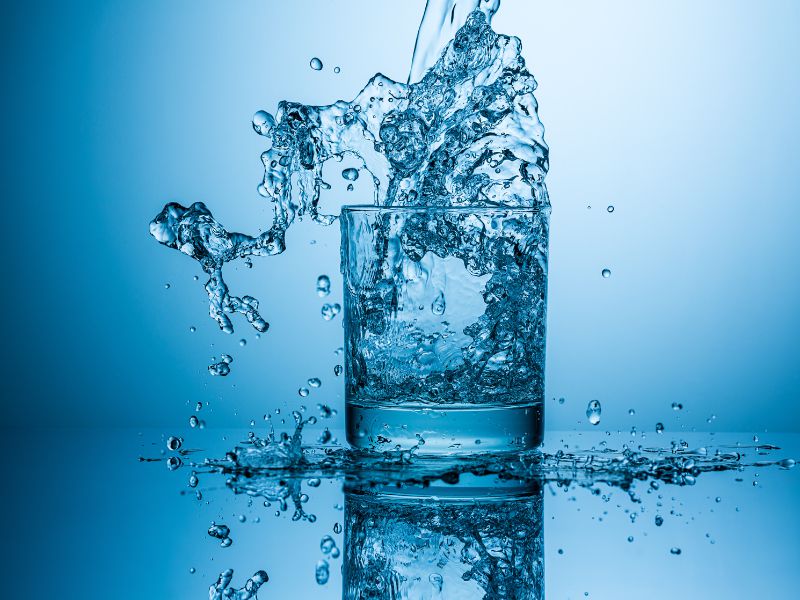When it comes to maintaining hair health and supporting metabolic functions, Biotin often takes center stage. However, many are unaware of the subtleties of taking this supplement, particularly the role of water intake, or the effects of taking Biotin on an empty stomach. Moreover, questions often arise regarding Biotin’s interaction with bodily functions and conditions, such as its relationship with estrogen levels, libido, and even concerns like fatty liver. In this post, we’ll address these topics, answering how much water you should drink with Biotin, and delving into other frequently asked questions to give you a comprehensive understanding of Biotin’s multifaceted role in our bodies.
Biotin FAQ
How much water should you drink with Biotin?
Biotin is a water-soluble vitamin, which means it dissolves in water and needs water for proper absorption and circulation in the body (1). While there’s no one-size-fits-all answer, staying well-hydrated is crucial when taking Biotin supplements. Drinking at least eight 8-ounce glasses of water a day is generally recommended, but you may need a different amount based on your body size, activity level, and current health status. When taking a Biotin capsule, be sure to take it with a full glass of water in order to support absorption.
What is Biotin, and what is it known for?
Biotin, or vitamin B7, is a water-soluble vitamin that’s integral in the conversion of nutrients into energy. It’s essential for the health of your hair, skin, and nails, supporting keratin production, a basic protein that makes up these structures (2). By aiding the formation of this protein’s building blocks, Biotin can help fortify each hair strand, potentially improving the hair’s overall health.
Can Biotin deficiency lead to hair loss?
Yes, Biotin deficiency, though rare, can contribute to hair thinning or hair loss (3). Symptoms of Biotin deficiency include thinning hair that may progress to the loss of hair across the body, not just on the scalp. If you suspect a deficiency, it’s important to consult with a healthcare professional for accurate diagnosis and treatment, which may include Biotin supplementation.
>>EXPERIENCE THE BENEFITS OF BIOTIN<<
Does Biotin interact with estrogen?
Currently, there’s limited research on the direct interaction between Biotin and estrogen. However, Biotin is involved in cell growth and the metabolism of amino acids and fats (4), which can indirectly influence hormonal balance, including estrogen levels. It’s always prudent to consult with a healthcare professional if you have concerns about hormonal imbalances or interactions.
Can Biotin affect your libido?
While Biotin’s primary association is with skin, hair, and nail health, there’s no substantial scientific evidence linking it with libido enhancement. Biotin’s role in energy production and cell proliferation (5) doesn’t directly translate to an increase in sexual desire. If you’re experiencing a change in libido, it’s essential to consider a wider range of physical and psychological factors and discuss these changes with a healthcare professional.
Is there a relationship between Biotin and fatty liver?
Biotin contributes to metabolic processes that break down fats in the body (5) , which is crucial for liver health. While there’s no direct evidence that Biotin supplementation can cure, prevent, or improve fatty liver disease, maintaining adequate levels of Biotin is important for optimal metabolic function. A deficiency in Biotin could potentially exacerbate conditions like fatty liver, so ensuring adequate nutrient intake is key.
Is it safe to take Biotin on an empty stomach?
Biotin supplements can be taken on an empty stomach as they don’t typically cause stomach upset. However, some people might experience nausea if they take any supplement without food. Listening to your body and, if necessary, adjusting your intake with a meal can help mitigate any potential discomfort.
What foods are good sources of Biotin?
Biotin-rich foods include eggs (particularly the yolk), nuts (almonds, peanuts, walnuts), seeds, beef liver, salmon, dairy products, avocados, and sweet potatoes (1,3). Incorporating a diverse range of these foods in your diet can help maintain healthy Biotin levels.
Are there any risks associated with taking Biotin supplements? Can you take too much?
Biotin is considered safe and non-toxic, even at high levels, because it’s water-soluble—excess amounts generally pass through the body with urine (3). However, taking supplements in high doses can cause false readings in certain lab tests, potentially leading to misdiagnosis or inappropriate medical treatment. Always inform your healthcare provider of any supplements you’re taking.
>>EXPERIENCE THE BENEFITS OF BIOTIN<<
Conclusion
Understanding Biotin’s role in the body extends far beyond its popular benefits for hair and skin. Staying hydrated, especially when considering how much water you should drink with Biotin, ensures that your body can effectively process this vital nutrient. While taking Biotin on an empty stomach is generally safe, and its interactions with estrogen and libido are not well-defined, it’s clear that Biotin plays a part in our overall health, with potential implications for conditions like fatty liver disease. As with any supplement, a conversation with a healthcare provider is essential before making decisions about Biotin supplementation, especially if you have underlying health conditions or concerns.

